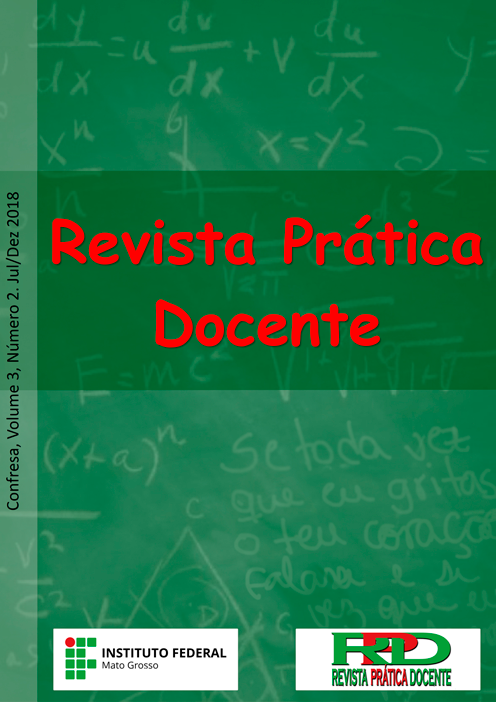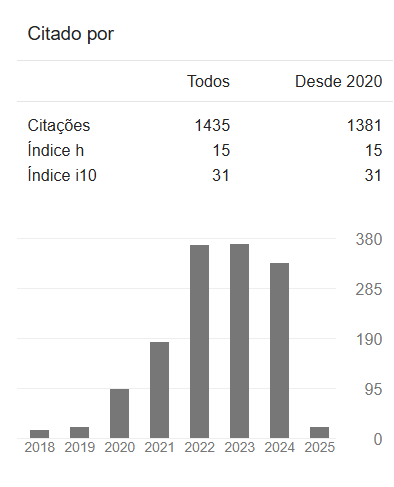INTEGERS AND DECIMALS NUMBERS: AN APPROACH TO MATHEMATICS CONTENTS THROUGH A GAME IN THE FACE OF THE DIFFICULTIES OF THE TECHNOLOGICAL SCENE OF BASIC EDUCATION
DOI:
10.23926/RPD.2526-2149.2018.v3.n2.p386-405.id231Keywords:
Mathematical Education, Integers and Decimal Numbers, Basic Education, TechnologiesAbstract
Seeking to contribute to research in Mathematics Education, delimiting the field of studies to the Whole and Decimal Numbers, here is presented the results of a proposal, to promote the use of technologies in Mathematics teaching, which aimed to help students in understanding the contents of Numbers Integer - Decimals and their operations. The proposal consisted in the adaptation and application of a trail game in digital format, using Excel software. The participants were students between 11 and 13 years old, from a public school in Paraná. Happening in three moments: Pre-test, Proposal and Post-test, allowed a view of the students' understandings about the content, before and after the application of the proposal. At the end, it is concluded that the students have considerable abilities regarding the use of algorithms of the addition of integers and decimals, already in the use of the subtraction operation, in the same context, presented considerable difficulties, which were considerably remedied after the application of the proposal.
Downloads
Metrics
References
BARLOW, M. Avaliação escolar - mitos e realidades. Porto Alegre: Artmed, 2006.
BOGDAN, R. C.; BIKLEN, S. K. Investigação qualitativa em educação: uma introdução à teoria e aos métodos. Portugal: Porto, 1994.
BORBA, M. de C. PENTEADO, M. G. Informática e Educação Matemática. 3ª ed. Belo Horizonte: Autêntica, 2007.
BORBA, R. E. de S. R.; SANTOS, R. B. Investigando a resolução de problemas de estruturas aditivas por crianças de 3ª série. Tópicos Educacionais, Recife, v. 15, n. 1-3, 1999. Disponível em: < https://goo.gl/eceni4> Acessado em: 15 out. 2018
BRASIL. Ministério de Educação e Cultura. LDB - Lei nº 9394/96, de 20 de dezembro de 1996. Estabelece as diretrizes e bases da Educação Nacional. Brasília: MEC, 1996.
BRASIL. Parâmetros curriculares nacionais: introdução aos parâmetros curriculares nacionais. Secretaria de Educação Fundamental. Brasília: MEC/SEF, 1997a.
BRASIL. Parâmetros curriculares nacionais: matemática. Secretaria de Educação Fundamental. Brasília: MEC/SEF, 1997b.
BRASIL. Parâmetros curriculares nacionais: matemática. Secretaria de Educação Fundamental. Brasília: MEC/SEF, 1998.
BRASIL. Parâmetros curriculares nacionais: Ciências da Natureza, Matemática e suas Tecnologias. Brasília: MEC/SEMTEC, 2000.
BRASIL. Parâmetros curriculares nacionais: Ciências da Natureza, Matemática e suas Tecnologias - Orientações Educacionais Complementares. Brasília: MEC/SEMTEC, 2002.
BRASIL. Orientações curriculares para o ensino médio: matemática. Secretaria de Educação Básica. Brasília: MEC/SEB, 2006.
BRASIL. Base Nacional Comum Curricular – Educação é a base. Brasília: MEC, 2017.
CARVALHO, L. M. T. L.; MONTEIRO, C. E. F. Reflexões sobre implantação e uso de laboratórios de informática na escola pública. Roteiro, Joaçaba, v. 37, n. 2, p. 343 – 360, 2012. Disponível em: < https://goo.gl/YW6JHA>. Acessado em: 15 dez. 2018
CIPRIANI, O. N. Construindo um Jogo Para Uso na Educação Matemática. 2007. 53 f. Monografia (Graduação) – Departamento de Ciências da Computação, Universidade Federal de Lavras, Lavras, 2007.
D’AMBROSIO, B. Formação de professores de Matemática para o século XXI: o grande desafio. São Paulo, Pro-posições, vol 4 n. 1 (10), mar. 1993, p. 35 - 41.
LEITE, W. S.; RIBEIRO, C. A. do N. A inclusão das TICs na educação brasileira: problemas e desafios. Revista Intercional de Investigación en Educación, Bogotá, v. 5, n. 10, p. 173 – 187, 2012. Disponível em: <https://goo.gl/7sUUZU>. Acessado em: 14 dez. 2018
LIMA, V. S. A.; SOUTO, D. L. P.; KOCHHANN, M. E. R. Tecnologias Digitais no Ensino Superior: um Zoom. Revista Prática Docente, Confresa, v. 2, n. 2, p. 138 - 157, 2018. DOI: https://doi.org/10.23926/RPD.2526-2149.2017.v2.n2.p138-157.id68
LOPES, T. B.; WIELEWSKI, G. D.; DE SÁ, P. F. Levantamento da produção acadêmica em teses e dissertações brasileiras sobre ensino e aprendizagem de números decimais no período de 1995 a 2015. REnCiMa, v. 9, n. 4, p. 110-125, 2018. Disponível em: https://goo.gl/VqbJja> Acessado em: 15 out. 2018 DOI: https://doi.org/10.26843/rencima.v9i4.1538
MARTINS, R. X.; FLORES, V. de F. A implantação do Programa Nacional de Tecnologia Educacional (ProInfo): revelações de pesquisas realizadas no Brasil entre 2007 e 2011. Revista Brasileira de Estudos Pedagógicos, Brasília, v. 96, n. 242, p.112-128, 2015. Disponível em: < https://goo.gl/944vVU>. Acessado em: 15 dez. 2018 DOI: https://doi.org/10.1590/S2176-6681/330812273
MERCADO, L. P. L. Novas Tecnologias na Educação: Reflexões sobre a Prática. Maceió: EDUFAL, 2002.
MUELLER, L. C. Uso de recursos computacionais nas aulas de Matemática. 2013. 117 f. Dissertação (Mestrado) - Mestrado Profissional em Ensino de Ciências Exatas, Centro Universitário Univates, Lajeado, 2013.
NOGUEIRA, C. M. I.; SIGNORINI, M. B. Crianças, algoritmos e o sistema de numeração decimal. Investigações em Ensino de Ciências, v. 15, n. 2, p. 259-274, 2016. Disponível em: < https://goo.gl/WPKJ8T> Acessado em: 15 out. 2018
VALENTE, J. A. O computador na sociedade do conhecimento. Campinas: UNICAMP/NIED, 1999.
Downloads
Published
How to Cite
Issue
Section
License
Copyright (c) 2023 A Revista Prática Docente tem o direito de primeira publicação

This work is licensed under a Creative Commons Attribution-NonCommercial 4.0 International License.
Authors who publish in this journal agree to the following terms:
- Authors retain the copyright and grant the journal the right of first publication, with the paper simultaneously licensed under the Licença Creative Commons Attribution allows the sharing of the work with acknowledgment of authorship and initial publication in this journal.
- Authors are authorized to take additional contracts separately, for non-exclusive distribution of the version of the work published in this journal (e.g. publish in institutional repository or as a book chapter), with acknowledgment of authorship and initial publication in this journal.











